My friend Weldon recently got his perfect job: cataloging and grading comic books and comic art for a large auction house. In recent weeks, he’s held the original artwork for the first appearance of Wolverine and the original art from a page of The Killing Joke (the page where Joker shoots and paralyzes Barbara Gordon…yes, he got to hold an original Brian Bolland page). He also held the first Batman comic book and Action Comics #1.
Millions of dollars worth of art and comic books have passed through his hands in recent weeks. Some say he’s lucky; others have asked how they can get a job like that.
The answer is simple: by doing what you love, without expectation of anything more than the love of the thing — and creating opportunities for yourself that might one day pay off.
That’s how Weldon got his recent job.
“Lucky” Friends
I’m fortunate to be friends with a lot of “lucky” people. By lucky, I mean the perception that some people have regarding how friends came to illustrate comic books and book covers; how they came to write novels and record the voices for well-known cartoons; how they became people who spend their days doing exactly what they love.
I’ve heard people say those who do what they want for a living are lucky. While luck (or some kind of break) often factors in after years of hard work, if it’s luck — it’s luck they made for themselves.
What many people never saw in these friends are the years of hard work behind the scenes. People staying home on Friday nights in their 20s because they were at an art desk. Using vacation time to work on their thing, instead of going to a beach and relaxing
. Taking the lowest job in a creative company and working their way up. The effort of it all can be exhausting. Years of working alongside “nobodies” while others clamored for the attention of those who could help — the hope of a shortcut to fame. Eventually, those “nobodies” bubbled up and connections were made…and a hand of help was extended.
Hey, I’ve been doing art for this publisher — let me put you in touch with them…
Luck has little to do with it.
How Do You Get to Do What You Love All the Time?
I still have a day job, so take this next bit for what it’s worth. It is, however, based on what I’ve seen happen in the lives of more than a few people I know.
How do you get that dream job? By doing what you love with no expectation other than doing the thing you enjoy doing. Do it first and foremost because you love it — not because you want a huge following.
Mel Brooks once said:
I don’t really do anything for the audience ever. I do it for me, and most of the time the audience joins me.
Live by that. Do what you love because you love it — not because you want to be a brand. Do what you love because you love it — not because you want a big audience. Do what you love because you love it — not because you want fame.
If you do what you love because you love doing it, maybe one day what you love will become the bulk of what you do.
But if it doesn’t, you’ve still won.
Back to Weldon
Weldon once made six figures selling software, but Weldon has always been happiest when he’s worked around comic books. From his early days of working in comic books stores to eventually editing and marketing comic books, it’s a field that often didn’t bring in tons of money for him, but it’s always made him happier than selling something solely for a paycheck.
There are decades of struggling for what Weldon loves, in much the same way artists struggle until their love pays off.
So the answer to “How do I get that cool job?” is to do what you love.
Independent travel writers aren’t born overnight. People making a living with their YouTube channels didn’t just build it and watch the audience roll in like the tide. Most successful novelists wrote 1-5 books before ever being published (and then wrote another 1-5 novels before they saw decent money (and even more never even see that)).
What looks like an overnight success rarely is.
There Are No Shortcuts to Great Work
One doesn’t sit down to write fiction for the first time and create a masterpiece. No one has sat with a cello and done something like this from the start. Canvases and brushes don’t guide an artist’s hand; decades of hard work do.
The friends I have who make a living doing what they love didn’t go all in and hope for the best — it was never a gamble because they just did what they loved for no other reason than they loved it and always pushed themselves to get better. There have been times in Weldon’s life that it might have seemed to those who look only at numbers that he was painting himself into a corner.
Clearly, he wasn’t:
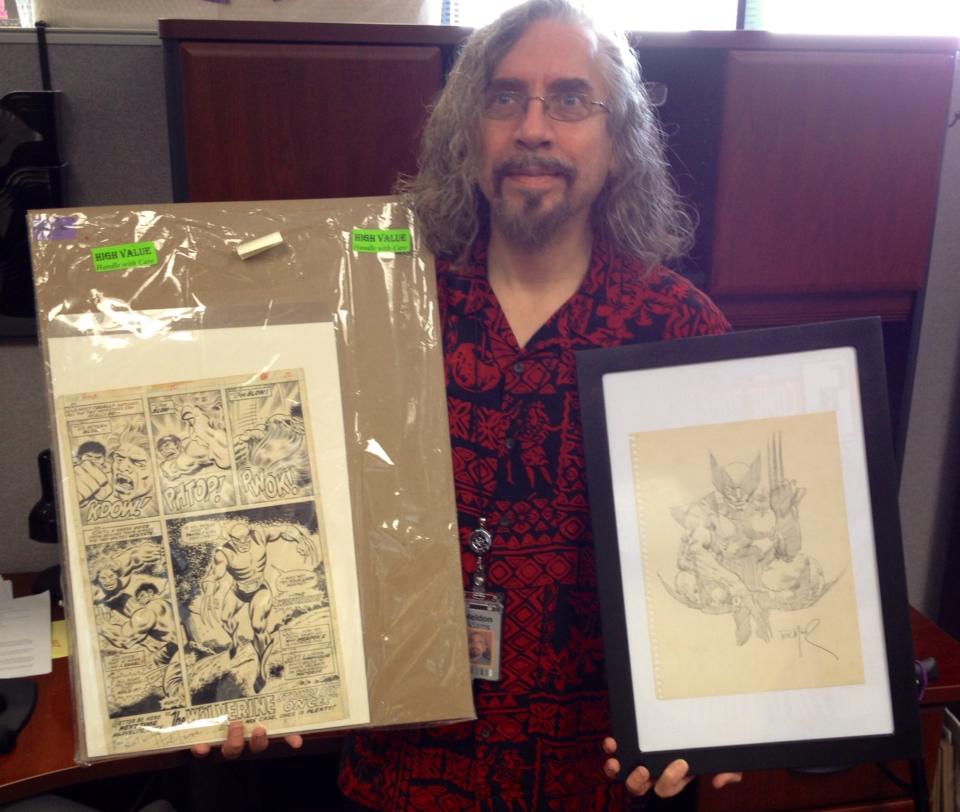
Holding the original art for the first appearance of Wolverine. And to make the image cooler? Why not bring in the first Frank Miller Wolvie sketch…from Weldon’s personal collection.
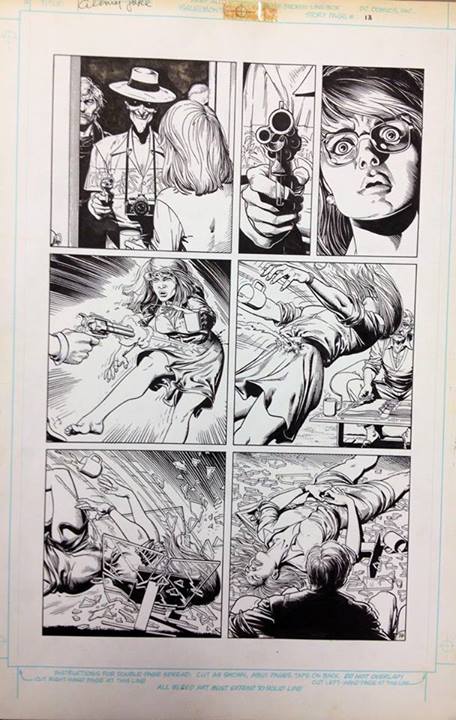
I think it was Weldon who introduced me to Camelot 3000 back in the 80s. So I’m not TOO jealous that he got to hold an original Brian Bolland page…from a great one-shot comic book. (Batman: Killing Joke.)

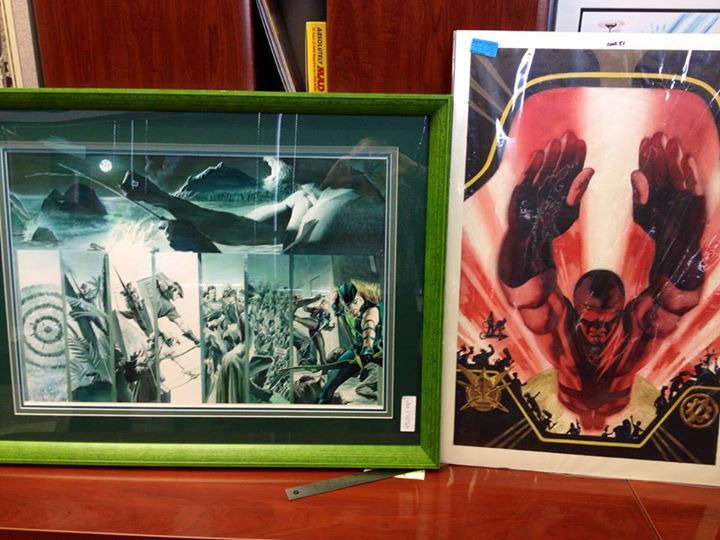
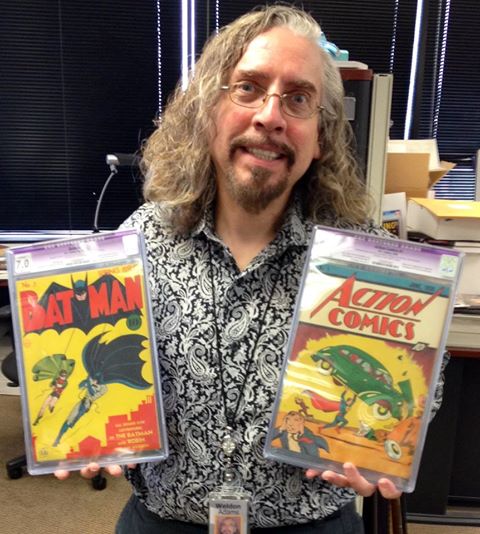
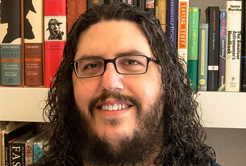
Yes. Exactly.
It makes me think about the time (I think it was) Picasso was asked by someone, How long did it take you to draw that?
And he replied, All my life.
That’s great! Cynthia’s drawn all her life, and I’ve been around to see several of her leaps in ability. I can see strength in some of my earlier writing, but sections where it’s clear I was still learning so much.
Some of the inspiration for this post came from being around people (online and offline) who seem to want that quick success. I saw a person in a podcasting community recently complaining about only getting 1000 listens/show (after only doing a handful of shows), and asking people if he should cut his losses. The podcast I do gets 25 listens/show right from the start, and over the weeks, it creeps up to 75-100. And we just recorded episodes 76 and 77 yesterday. If only my friend and I listened, I’d still do it because I love it.
Last week I gave a talk to a tech group about podcasting and doing other things online. At the end, there were three points I made that I hoped people would consider. One of them is to always remember they don’t have to listen. They don’t have to read or watch what you do or buy what you’re selling. Knowing that, and taking it to heart, I feel honored that 100 people listen to what my friend and I do on the podcast. My personal blog gets about 10 visitors a day on average and 25-50 on days I post a new blog. The Juggling Writer gets about 25 visits a day and 25-100 visitors when I post something new.
I’m content with those numbers because I know that doing what I love may one day amount to something “more,” but if it never does, I’m still doing something that makes me happy, that I can repeat regularly.
I liked this Seth Godin blog from yesterday. It’s more about technology, but I also saw it as something that can be connected to the mentality that one’s work doesn’t have worth unless they achieve a certain success. So…if I went into podcasting expecting to get 10,000 listens by the end of month two and only got 5,000, I’ve failed and would feel a bit down that a goal wasn’t reached — no matter how unrealistic that goal is. Worse, those who hope to quit their day job inside months and podcast full time. (Like the guy who was bummed that only 1000 people listen to his show.)
I used to attach writing to a perceived success: I wanted to make a living writing fiction, like most younger writers. I think I put in a deeper effort than many over the years…and I was told by others — because I did — that I “deserved” to make it more than those just cranking out novels. It was always nice having people believe in the things I wrote, but with each thing that was met with, “I loved this story; you’re a good writer, but I have no idea how I would market this, so I’m passing,” … I felt bummed. I take rejection very well — it’s never a personal thing, especially when agents and editors like what I’ve done. But because I attached my “success” as a writer to “making it,” I was often bummed that it would be another several years at the day job until even having that hope of another chance.
Now…I have a decent day job that allows me to write what I want. And I’ve never been more satisfied by writing in all the years. If something happens with what I’m writing, that would be great. But since I now attach its “success” to the enjoyment of the act and seeing myself get better, that’s reward enough. If it ever becomes something more, it will be because I’ve loved it and done it [seriously] for 25 years…not because the goal was fame or having a following.
Yes!
I think that doing something for fame, for an audience, etc is essentially working to get approval of who you are as a person. Not to say that can’t be a motivator for someone, but striving for excellence in your art has to be there somewhere.
I also think about the “one hit wonders” in music, and how many of them are famous for their music, but didn’t really achieve that billboard success. They still made incredible music.
Decent day jobs are awesome.
I’ve said for awhile if someone came to me and said, “Here’s a pile of money — write only for me,” that I would. Because it would allow me to do what I love more than I like my day job. Fame and a following has never been a motivator for me. Working hard and hoping that one day I could write what I want full time has always been the dream — not a whirlwind book tour and household recognition.
I will always have that little nagging thought in the back of my mind: “I complete more when I’ve not had a day job — the day job takes 40 hours out of the week that could be spent doing what you love.” But it hit me a couple years ago when a friend doing art on a licensed property said, “I’m sooooooooooo sick of working on stuff I don’t want to do, just to pay the bills. What I wouldn’t give to do exactly what I want to do!”
My day job allows me to write exactly what I want to write. I don’t have to write something I don’t want to write to pay the bills because a good day job with cool people and interesting-enough work (as far as tech writing goes), covers that. I get to work from home a couple days a week, and when I go into the office…it’s in a very neat complex that is reached by very scenic back roads that I like driving…and only a handful of miles away.
I can dwell on, “I’m not doing what I love most full time,” but I know that sometimes that isn’t what it’s cut out to be. I would rather have a day job and write what I want than be told, “This is a great book, but we can’t market it unless you make the main character an alien and the emotional ending is cut and replaced with a chase scene.”
In many ways, I’d almost prefer the wealthy patron who gets a thrill out of being the only person other than me to read what I write…an exclusive agreement where I’m paid well to do what I love, even if it meant nobody else would see it. In many ways, for me, I wanted the life of a writer because I love working on writing 2-4 hours a day, thinking about it all the time, and then being able to work on other things that make me happy. I love time for long walks and hikes or time just lying on the couch, staring at the ceiling, and thinking. Not having to answer, “Can you show this to your agent,” at parties, or traveling city to city on a tour, but never really seeing where you are because it’s all about promotion.
All I have to do is find that person with a pile of money who wants exclusive reading rights, and I’m set!